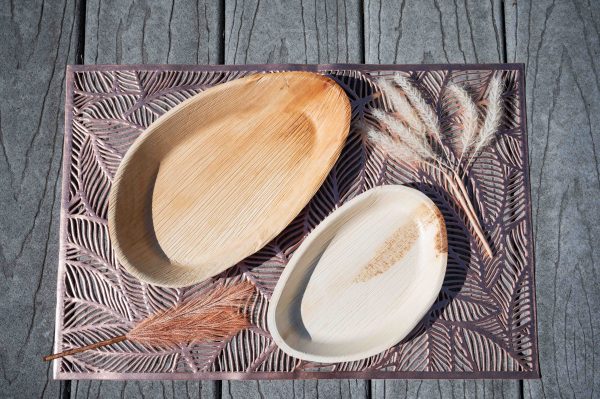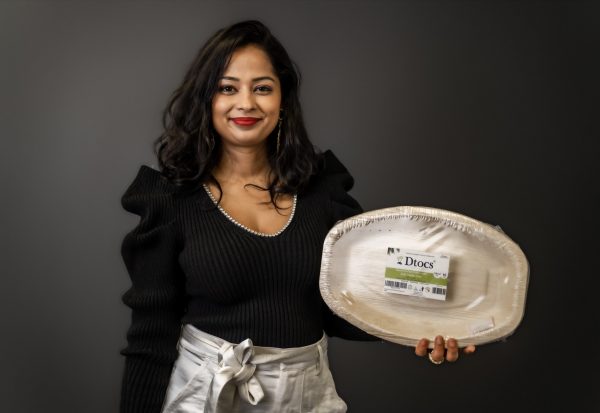Founder Friday Feature:
Pallavi Pande of Dtocs
This Women’s History Month, Startup CPG is proud to partner with Settle for a month of Female Founder Fridays! Settle is thrilled to continue their partnership with Startup CPG to elevate female founders. With a mission to power the CPG economy with financial tools, Settle levels the financing gap for female-founded brands with Settle Working Capital. Settle aims to empower women founders scaling their businesses in order to influx more women perspectives, inclusive brands and goods into the consumer ecosystem.

Meet Dtocs: the brand using fallen palm leaves to create a sustainable dinnerware solution
Dtocs founder Pallavi Pande was inspired to create a solution [to disposable dinnerware] out of a personal need. “I love to party,” she explains, “and I used to buy those premium quality paper plates from Costco, but then I realized how much waste I was creating.” After becoming a mom, Pallavi thought, “What am I role modeling? How do I become a better parent and a more responsible human?” It was then that Pallavi went back to her roots in India. “Growing up, I ate on banana leaves, and I wanted to start a brand that reflected that practice.”
To answer her question, Pallavi returned to India to source raw materials, and she decided to use palm leaves to create her sustainable dinnerware solutions. She explains, “We rescue fully matured areca palm leaves in India and give them one more use. I wanted to create a product that is microwave-safe, composts in three months, and looks aesthetically pleasing, while also providing convenience. Dtocs offers a sustainable alternative to cheap paper, toxic plastic, expensive bamboo, and boring traditional tableware. ”
Pallavi officially launched Dtocs in 2019, and at first, she focused on direct-to-consumer operations. However, as Dtocs has grown, Pallavi has pivoted to larger events where their products can have more impact. “We started doing partnerships with food service and hospitality groups and doing more weddings and corporate events. I eventually got a partnership with Amazon, which allows me to sell to B2B clients like restaurant owners.” By leaning into such partnerships, Pallavi has been able to scale Dtoc five times since its launch.

The importance of networking
Beyond the quality of her product, Pallavi credits much of Dtocs’ success with her tenacious networking. She explains, “You need to be in front of people. As founders, we sometimes get so engrossed in running the business that we don’t carve out time to go to networking events. But there may be industry leaders at the event, and if I don’t attend, nobody’s going to see me. Nobody’s going to get information about what I do, who I am, what I have to offer, and the reason they should do business with me.”
Networking, Pallavi explains, is also particularly important for minority business owners. “We often don’t know how to break through [in CPG]. I didn’t know how to contact or who to contact when looking for potential partnerships.” Five years into the business, however, Pallavi has cultivated a robust network of CPG founders, business owners, and industry leaders she can turn to for advice. Many of these connections have come from her participation in events and accelerator programs. Pallavi says. “If you don’t get yourself out there, you won’t gain access [to this industry.]”
Honing in on your pitch
Part of “getting yourself out there,” of course, is pitching your brand. “We are pitching almost every day,” Pallavi says. “It may be for an article, a podcast, volumes at a store, or an online marketplace.” That said, pitching your brand can be scary and vulnerable for many founders and it takes time to hone in on your brand’s story. Pallavi’s advice? “Practice, practice, practice. Almost every accelerator program has a pitch at the end, so that is a great way to learn. Some of the accelerator programs will also open a stage in front of retailers or other people who can help you grow and make connections. From there, you can start crafting your stories, and even today after five years of pitching, I’m still figuring out what is missing [in my pitch].” Even when you think your pitch is locked and loaded, Pallavi explains, “the panel you’re pitching is always different and [they] want to listen to different things. They’ll stop you whenever they want to, and you can’t control them.”
“Your pitch should become your expertise — whether it’s 60 seconds or ten minutes, you should know the basics of what people need to hear. Pay attention to the feedback you get because that’s your key. Put all of the feedback in an Excel sheet, and keep honing your pitch based on that. Keep applying to free pitch competitions, and just practice practice, practice. When I’m on vacation, I’m not technically working but I’m still working because I never stop pitching.”

Searching for the elusive ‘balance’
“There’s a reason my kids called me Mompreneur,” Pallavi says. “I’m not good at balance, but I am good at blending. When I travel to a conference or trade show, [my family] travels with me and we make vacations out of it. So while I’m at a pitch or conference, my husband is doing stuff with the kids, and at the end of the day, we all enjoy our time together. We are still together and that’s what matters. If my husband is also traveling for work or he’s busy, I will take help from friends. I have such supportive friends. I’ll cook food for all of the kids, including my friends’ kids, so they don’t have to cook while also doing me a favor.”
Pallavi explains, “It’s about what works for you. My calendar is set up for six months with my spouse, and it’s clear who’s doing what. We try to plan things out in advance so nobody is under stress or anxiety at the last minute. Not us, and not our children. It requires a lot of communication, planning, and asking for support from our friends and family.”
Finding joy in building community
Pallavi finds great joy in building Dtocs the brand, but she is also deeply committed to building communities that go beyond her product alone. “When I moved to Portland eight years ago, I didn’t know anybody, and I was going through postpartum depression with two little kids. So I started this community called Portland Brown Mommies to meet people, and today it has 2,000 local women [in it]. I receive messages every day from people saying, ‘Thank you for creating this community,’ and I am very proud of that.”
Pallavi’s commitment to her community also extends to her business. “I’m a community builder, and I intentionally chose to source my products in India to give back to the community I’m from. We give away part of our proceeds, we do scholarships for children, and we donate sewing machines to women to empower them to support themselves. My social impact pillar is very close to my heart and fills me up every day — across countries and right here in my hometown.”
About Settle:
Settle gives you the best way to handle your cash flow—one designed for consumer brands that are ready to grow. With a modern AP platform designed for automating all things payments, pay vendors, and manage purchase orders and invoices – and stop paying with checks. And you can Settle now, pay later with Settle Working Capital’s founder-friendly financing, for qualifying businesses. So instead of letting your cash flow hold you back, join brands like Deux, Truvani and Olipop to confidently scale for what’s next.





All Comments